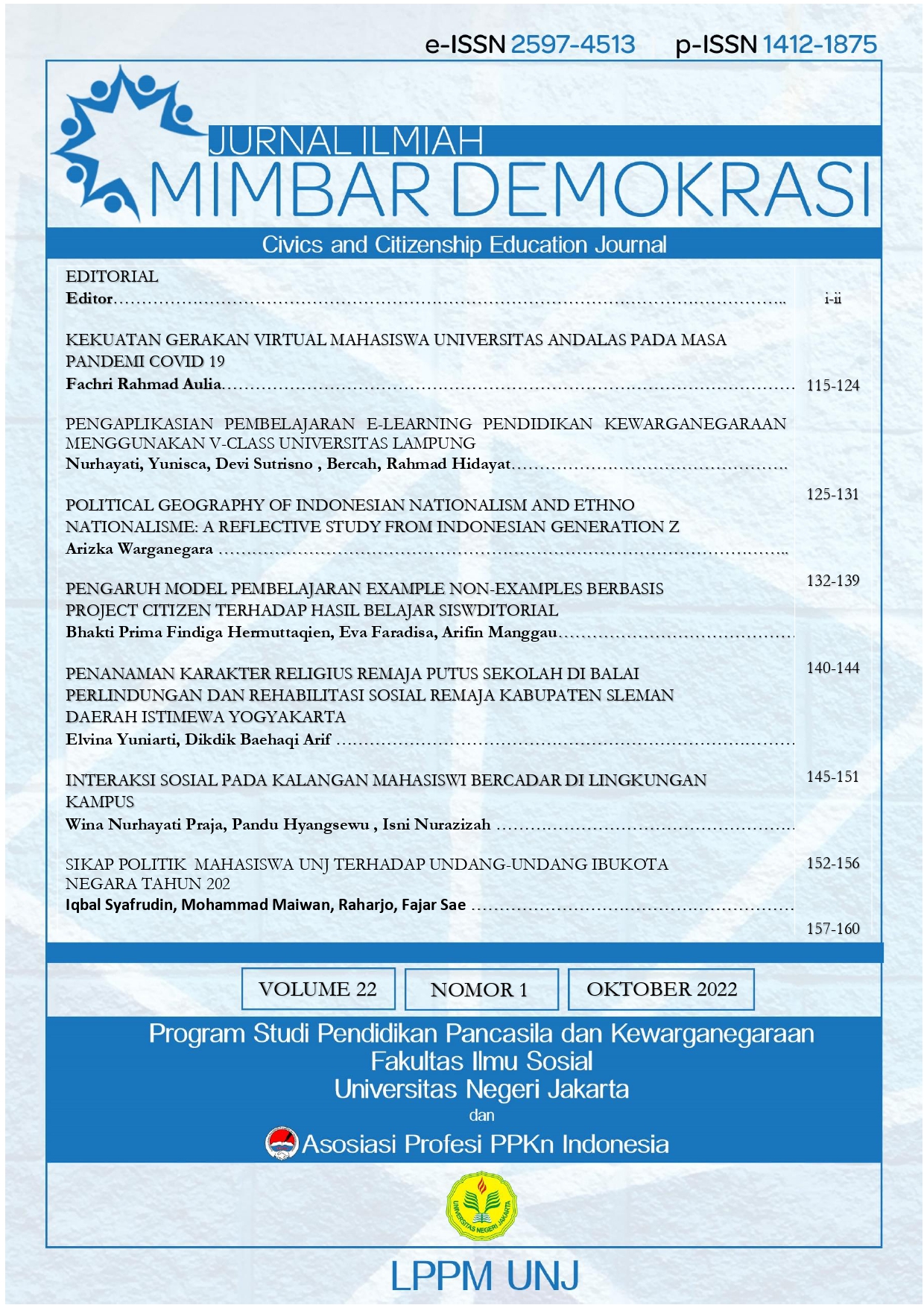Political Geography of Indonesian Nationalism and Ethno Nationalism: A Reflective Study From Indonesian Generation Z
DOI:
https://doi.org/10.21009/jimd.v22i1.27298Keywords:
Indonesia, Nationalism, Ethno nationalism, Z GenerationAbstract
Debates on nationalism and ethno nationalism have intensely developed during the early decade of political reformation in Indonesia, that is, in the early 2000s. At that point, the demand for segregation from the Republic of Indonesia emerged from several districts, such as Riau and Papua. In this era, the sentiment to decentralised from the Republic of Indonesia has been well suppressed, particularly in some areas, Aceh included. On the other side of the coin, the process of welfare distribution is going well. It is supported by the balance of power between the central and local authorities, which has successfully reduced this sentiment. These observations were conducted through a qualitative method by conducting interviews with Generation Z, which were divided into two clusters: based on gender and the respondent’s status either as a student or a fresh graduate. This paper investigates the extent of understanding the nationalism and ethno nationalism among Generation Z in Indonesia. In-depth interviews were reflectively conducted in which the research participants were asked to answer some questions and share their views and understanding of this discussion. This study concludes that Generation Z Indonesian proved to have a comprehensive understanding of nationalism. They viewed that modules about nationalism should be officially included in elementary and high school curricula; thus, the students will be exposed and have a solid understanding of nationalism from an early age.
References
Aspinall, E. (2016). The New Nationalism in I ndonesia. Asia & the Pacific Policy Studies. 3(1), pp.72-82.
Barker, J. (2008). Beyond Bandung: developmental nationalism and (multi) cultural nationalism in Indonesia. Third World Quarterly. 29(3), pp.521-540.
Bertrand, J. (2004). Nationalism and ethnic conflict in Indonesia. Cambridge University Press.
Bourchier, D.M. (2019). Two decades of ideological contestation in Indonesia: From democratic cosmopolitanism to religious nationalism. Journal of Contemporary Asia. 49(5), pp.713-733.
Burhani, A.N. (2017). Ethnic Minority Politics in Jakarta's Gubernatorial Election. ISEAS-Yusof Ishak Institute.
Gayatri, I.H. (2010). Nationalism, democratisation and primordial sentiment in Indonesia: Problems of ethnicity versus Indonesianness (the cases of Aceh, Riau, Papua and Bali). Journal of Indonesian Social Sciences and Humanities. 3(1), pp.189-204.
Gellner, E. (1983). Nations and Nationalism. Blackwell.
Goebel, Z. (2013). The idea of ethnicity in Indonesia. Tilburg Papers in Culture Studies, Working Paper Number. 72.
Hamid, A. (2019). Populism in the 2017 Jakarta gubernatorial election. Journal of Governance. 4(1), pp.1-15.
Haris, S. (2004). General elections under the New Order. Elections in Indonesia: The New Order and Beyond. pp.18-37.
Liddle, R.W. and Mujani, S. (2013). 2. Indonesian Democracy. Democracy and Islam in Indonesia. Columbia University Press, pp.24-50.
Mujani, S. (2020). Religion and Voting Behavior: Evidence from the 2017 Jakarta Gubernatorial Election. Al-Jami'ah: Journal of Islamic Studies. 58(2), pp.419-450.
Setijadi, C. (2017). Ahok's Downfall and the Rise of Islamist Populism in Indonesia. ISEAS-Yusof Ishak Institute Singapore.








